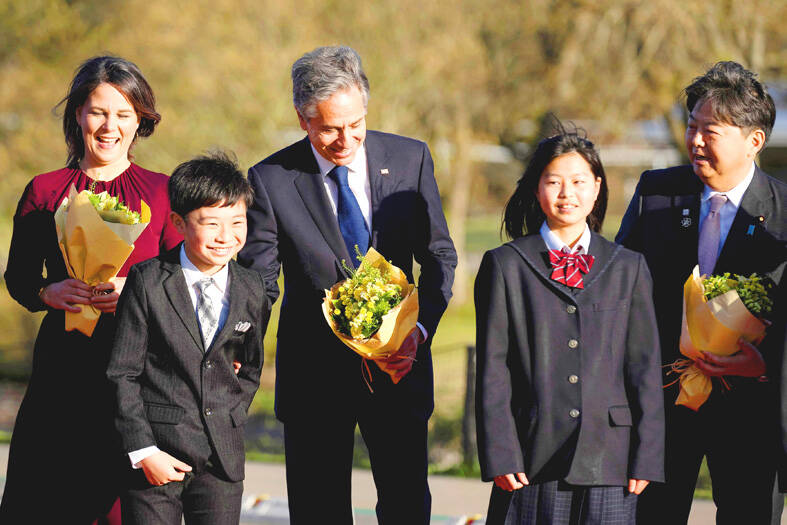The relationship between China and Europe would be determined by Beijing’s behavior, including what happens with Taiwan, the EU’s foreign policy chief said yesterday.
The comments from EU High Representative for Foreign Affairs and Security Policy Josep Borrell, in a remote address at the start of the meeting of the G7 foreign ministers in Japan, highlighted two of the themes that have come into focus ahead of the three-day gathering: the need for a united approach to China and concerns about Taiwan.
China is front and center as the foreign ministers of the world’s advanced democracies meet in the Japanese resort town of Karuizawa.

Photo: Reuters
The only Asian member of the grouping, Japan has increasing concerns about China’s growing might in the region, and is particularly focused on the possibility of military action against Taiwan.
“Anything that happens in Taiwan Strait will mean a lot to us,” Borrell said, stressing the need to engage with China and keep communications open.
He described China as a “partner, competitor and systemic rival,” and said that which of those three relations the EU would lean toward “will be determined by China’s behavior.”
The ministers are likely to discuss their “common and concerted” approach to China, a senior US Department of State official said.
“There is collective concern about a number of the actions that China is taking,” the US official told reporters on the plane to Japan from Vietnam, declining to be identified because of the sensitivity of the information.
Recent G7 statements have included calls for candid and constructive engagement with Beijing while recognizing that “individually all the G7 members have deep economic relationships” with the world’s second-largest economy, the official said.
German Minister of Foreign Affairs Annalena Baerbock sought to underscore the G7’s unity.
“As democracies, we are successful in systemic competition with autocratic forces when our partners and friends around the world have confidence in us. We must avoid that our unity is misunderstood by others as separation or that new rifts are opened,” she said in a statement before her trip to Japan.
Taiwan would also be a subject of discussion, the senior US official said, but declined to comment on any specific new language.
Separately, a state department official said that G7 foreign ministers would also discuss how to ensure Ukraine has weapons and other defensive equipment it needs over the long term, North Korea and ways to deepen ties with Southeast Asian nations, as well as the Quadrilateral Security Dialogue, which consists of the US, India, Japan and Australia.
There would also be extended discussions on how the G7 can spur more global infrastructure building in developing nations across Asia, Africa, the Middle East and Latin America, the official said, adding that some announcements are planned for next month during the leaders’ summit.
Additional reporting by Bloomberg

AGING: As of last month, people aged 65 or older accounted for 20.06 percent of the total population and the number of couples who got married fell by 18,685 from 2024 Taiwan has surpassed South Korea as the country least willing to have children, with an annual crude birthrate of 4.62 per 1,000 people, Ministry of the Interior data showed yesterday. The nation was previously ranked the second-lowest country in terms of total fertility rate, or the average number of children a woman has in her lifetime. However, South Korea’s fertility rate began to recover from 2023, with total fertility rate rising from 0.72 and estimated to reach 0.82 to 0.85 by last year, and the crude birthrate projected at 6.7 per 1,000 people. Japan’s crude birthrate was projected to fall below six,

US President Donald Trump in an interview with the New York Times published on Thursday said that “it’s up to” Chinese President Xi Jinping (習近平) what China does on Taiwan, but that he would be “very unhappy” with a change in the “status quo.” “He [Xi] considers it to be a part of China, and that’s up to him what he’s going to be doing, but I’ve expressed to him that I would be very unhappy if he did that, and I don’t think he’ll do that. I hope he doesn’t do that,” Trump said. Trump made the comments in the context

SELF-DEFENSE: Tokyo has accelerated its spending goal and its defense minister said the nation needs to discuss whether it should develop nuclear-powered submarines China is ramping up objections to what it sees as Japan’s desire to acquire nuclear weapons, despite Tokyo’s longstanding renunciation of such arms, deepening another fissure in the two neighbors’ increasingly tense ties. In what appears to be a concerted effort, China’s foreign and defense ministries issued statements on Thursday condemning alleged remilitarism efforts by Tokyo. The remarks came as two of the country’s top think tanks jointly issued a 29-page report framing actions by “right-wing forces” in Japan as posing a “serious threat” to world peace. While that report did not define “right-wing forces,” the Chinese Ministry of Foreign Affairs was

PREPAREDNESS: Given the difficulty of importing ammunition during wartime, the Ministry of National Defense said it would prioritize ‘coproduction’ partnerships A newly formed unit of the Marine Corps tasked with land-based security operations has recently replaced its aging, domestically produced rifles with more advanced, US-made M4A1 rifles, a source said yesterday. The unnamed source familiar with the matter said the First Security Battalion of the Marine Corps’ Air Defense and Base Guard Group has replaced its older T65K2 rifles, which have been in service since the late 1980s, with the newly received M4A1s. The source did not say exactly when the upgrade took place or how many M4A1s were issued to the battalion. The confirmation came after Chinese-language media reported